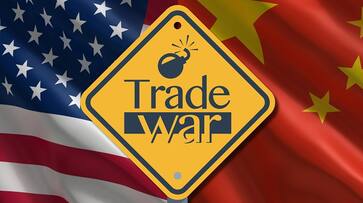The impact India feels will be indirect, as the cost of goods that are produced by American companies in China will increase and the US dollar strengthens due to the risk aversion caused in markets worldwide; however, owing to this domestic consumption-driven country's growth higher than 7.5% and the world's growth greater than 3.5%, the adverse effects will be minimal
The rise in commodity prices as a result of the tariff imposition by the US on Chinese imports and by China on American imports will affect India in an indirect manner as far as goods that follow a China-US route from manufacturing to retail is concerned.
The $200 billion that the Donald Trump administration has imposed on China’s exports in the latest round of the trade war would escalate the cost of about 50% of goods, the production of which businesses prefer outsourcing to China to reduce costs. These goods are then exported worldwide, India being one of the importers.
The US is levying 25% tax on imports of 800 products such as those of electric cars and industrial robots. This could be a blessing in disguise for the labour force in India, apprehensive of job cuts due to automation.
Chinese tax on American imports will affect the price of food and beverages like soybean, beef and whiskey, which Americans need to worry about, not India.
Our nation will be affected also by a rise in the value of the US dollar because of the risk aversion that the American tariffs on imports from China might trigger worldwide. A country that imports more than exporting its products, India will have to pay substantially more for the things it buys from the world. This will have a spiralling impact on the cost of commodities in this country.
To cushion the impact, however, while India is expected to grow at a rate of above 7.5%, the whole world, the IMF says, will grow at a modest 3.5%.
Also, as noticed during the 2008 subprime mortgage crisis that caused a mere slowdown in India, the domestic economy functions largely on domestic consumption, making it somewhat immune to international shocks.
Last Updated Jul 6, 2018, 7:32 AM IST









![Salman Khan sets stage on fire for Anant Ambani, Radhika Merchant pre-wedding festivities [WATCH] ATG](https://static-gi.asianetnews.com/images/01hr1hh8y86gvb4kbqgnyhc0w0/whatsapp-image-2024-03-03-at-12-24-37-pm_100x60xt.jpg)
![Pregnant Deepika Padukone dances with Ranveer Singh at Anant Ambani, Radhika Merchant pre-wedding bash [WATCH] ATG](https://static-gi.asianetnews.com/images/01hr1ffyd3nzqzgm6ba0k87vr8/whatsapp-image-2024-03-03-at-11-45-35-am_100x60xt.jpg)


